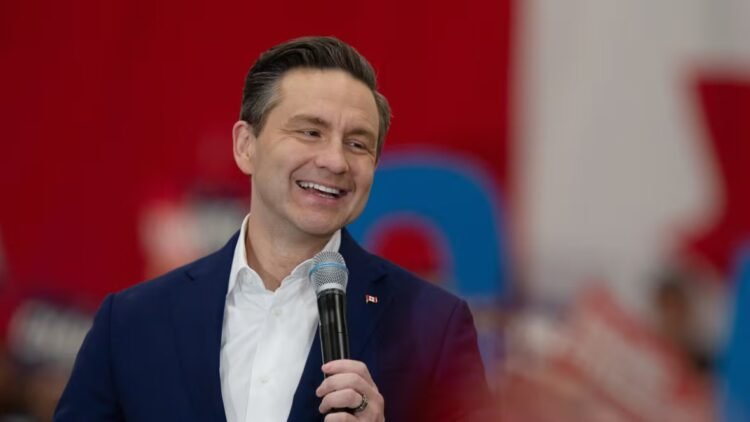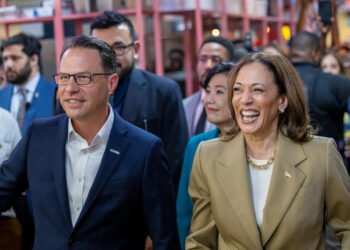SASKATOON — With just days remaining before Canadians head to the polls, Conservative Leader Pierre Poilievre made a pivotal campaign stop in Saskatchewan — a province traditionally painted in deep Tory blue — but the tone of the visit hinted at shifting political winds.
Appearing in a packed warehouse in Saskatoon on Thursday night, Poilievre was met with enthusiastic cheers from hundreds of loyal supporters. But his appearance in a province where his party swept all 14 federal seats in both 2019 and 2021 raised eyebrows among political observers. Analysts are questioning whether the visit was a routine show of strength — or a sign of concern.
In a speech peppered with jabs at Liberal Leader Mark Carney, Poilievre ridiculed Carney’s recent revelation that former U.S. President Donald Trump joked about Canada becoming America’s 51st state during a March phone call.
“Is there a firefighter in the house?” Poilievre asked, grinning. “There’s an emergency — Mark Carney’s pants are on fire again.”
But the rally wasn’t without disruption. Protesters waving American flags — seemingly embracing the 51st state rhetoric — were quickly escorted out. A lone pro-Palestinian demonstrator also interrupted Poilievre’s speech, only to be drowned out by supporters chanting “we want change,” led by Poilievre himself.
These outbursts mirror similar protests during recent Carney appearances in Saskatoon, further illustrating how heated and polarized the campaign has become, even in regions previously considered political foregone conclusions.
Cracks Beneath the Surface
Political experts suggest Poilievre’s decision to campaign in Saskatchewan so close to election day may indicate unexpected vulnerabilities.
“The timing is interesting,” said Loleen Berdahl, a political science professor at the University of Saskatchewan. “You don’t spend precious campaign days in a safe zone unless you see potential trouble.”
Though federal Liberals haven’t claimed a Saskatchewan seat since 2015, red signs are reappearing across urban neighborhoods — particularly in Saskatoon and Regina — signaling a potential shift.
Berdahl points to weakening NDP support as a possible factor behind the Liberal resurgence, particularly in key battlegrounds like Desnethé–Missinippi–Churchill River and parts of the province’s two major cities. “There’s historic animosity toward the federal Liberals here, so any visible enthusiasm is noteworthy,” she said.
Premier’s Endorsement, but Growing Questions
The Conservative campaign received a timely boost from Saskatchewan Premier Scott Moe, who posted a video endorsement declaring, “Saskatchewan will never be part of the U.S., but isn’t it time we had a government that treats us like we’re part of Canada?”
Still, some argue the party’s recent pledge to eradicate “woke” ideology from public institutions — featured prominently in its platform — signals a retrenchment strategy rather than an expansion effort.
“To me, that’s more about shoring up the base than attracting new voters,” said Berdahl. “It plays well in rural areas but not so much in urban centers.”
She added that the rhetoric echoes language heard in Alberta and the U.S., pointing to how culture-war themes are increasingly influencing Canadian political discourse.
Liberal Hopes, Modest Expectations
Despite the momentum, expectations for a major Liberal breakthrough remain tempered. Berdahl predicts a maximum of three seat pickups — a modest number, but one that would mark a significant shift in a province long dominated by Conservatives.
“It wouldn’t change the electoral map dramatically, but it would say a lot about changing political attitudes in the Prairies,” she said.
Interestingly, the federal NDP appears to be falling out of favor, even as its provincial counterpart gains traction. In the last provincial election, Saskatchewan’s New Democrats secured 44% of the vote and 27 of 61 seats, but that success hasn’t translated to federal support.
“There’s a clear effort by the provincial NDP to distance themselves from Jagmeet Singh and the national party,” Berdahl noted.
The Road Ahead
As the campaign enters its final stretch, Saskatchewan — once considered firmly in Conservative hands — is proving more contested than expected.
Poilievre’s high-energy rally was aimed at reinforcing loyalty, but the presence of protestors, the cautious optimism of Liberals, and the erosion of NDP support suggest a more complex and evolving political landscape.
If even a few seats change hands, it could signal a deeper shift — and a warning for parties that take traditional strongholds for granted.

 English
English



























































